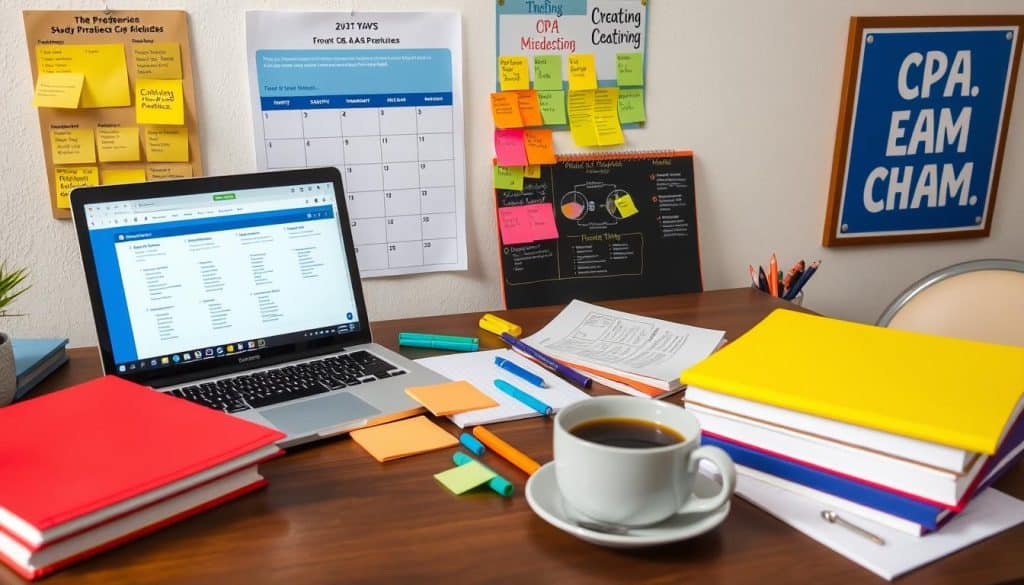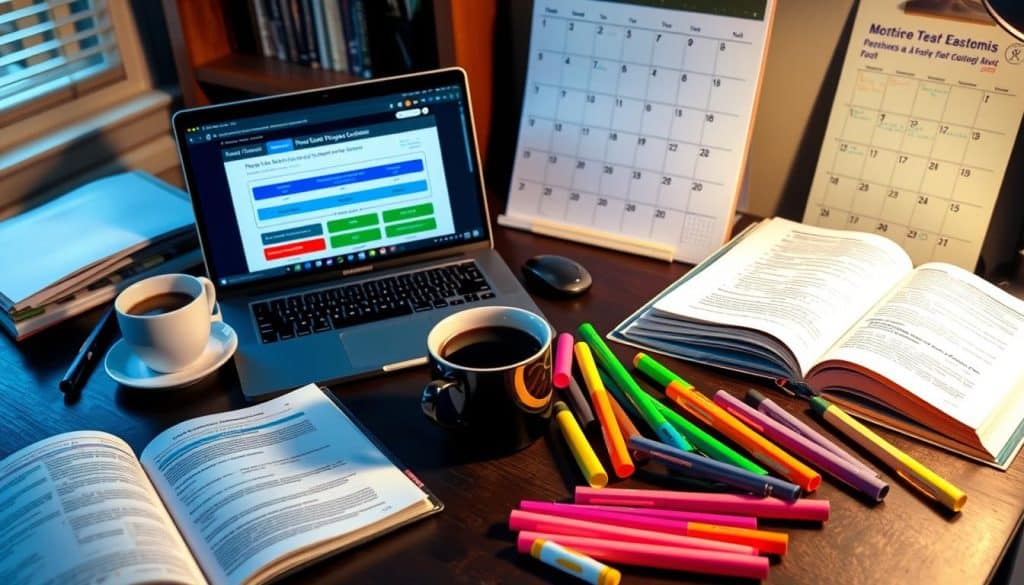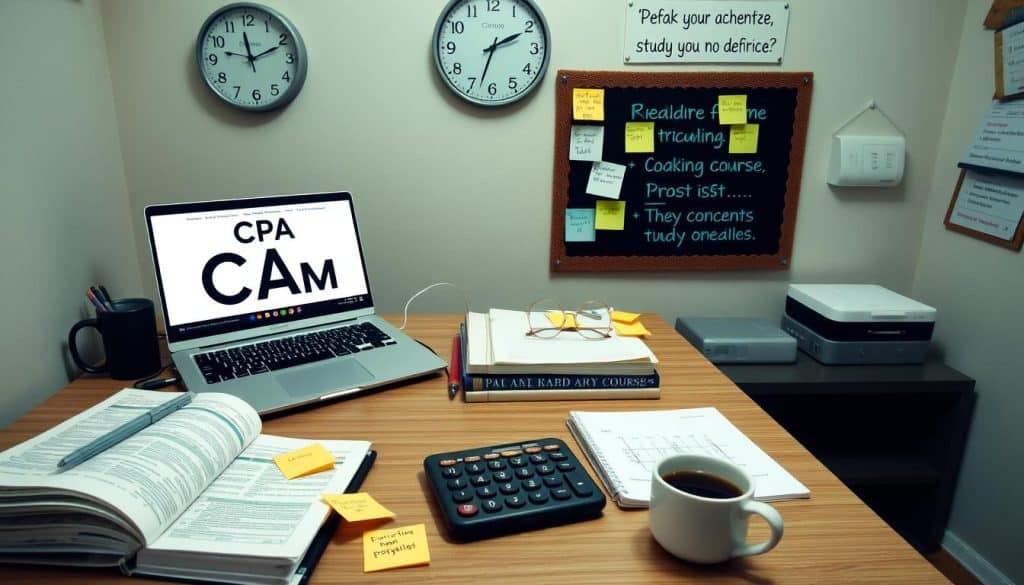Passing the Certified Public Accountant (CPA) exam is a big deal for those in accounting. It’s tough, with a pass rate of about 50% per section. Now, cramming like in college won’t cut it. You need a solid, focused plan to really get the material.
Eating right, exercising, and getting enough sleep are key for your brain. Start studying for the CPA exam early, as laws and rules change often. Having a clear study plan helps you stay focused and avoid feeling overwhelmed.
It’s also crucial to cut out distractions. Tell your loved ones and work about your study time so they know not to bother you. Having a quiet, dedicated study area helps you stay focused and productive.
Key Takeaways : CPA Exam
- Develop effective study habits, including proper nutrition, exercise, and rest
- Start preparing for the CPA exam as soon as possible to stay ahead of changes
- Create a detailed study plan and stick to it to avoid information overload
- Minimize distractions by informing friends, family, and employers about your study commitments
- Find a dedicated, distraction-free study space to enhance focus and productivity
Understanding the CPA Exam Structure and Requirements
The Certified Public Accountant (CPA) exam is a key step for those wanting to become accountants. It has four main parts: Auditing and Attestation (AUD), Business Environment and Concepts (BEC), Financial Accounting and Reporting (FAR), and Regulation (REG). Each part tests different skills with multiple-choice questions, simulations, and written tasks.
Candidates have 18 months to finish all four parts after passing the first one. The exam scores range from 0 to 99, with 75 being the pass mark. The BEC section is the easiest, but FAR is the toughest, with the lowest pass rate.
Core Sections and Time Commitments
Each section of the CPA exam needs a lot of study, with 100-200 hours per section. It’s important to spend enough time to master all the accounting and regulatory knowledge needed.
State-Specific Requirements and Eligibility
To take the CPA exam, you must meet certain requirements set by your state. These include education, residency, age, and citizenship rules. It’s crucial to check your state’s specific rules.
Testing Center Protocols and Preparations
The CPA exam is given at Prometric centers, which follow strict security rules. You need to bring two IDs that match your NTS and know the center’s rules to have a smooth test.
Knowing the CPA exam’s structure, rules, and testing process helps aspiring accountants prepare well. This increases their chances of passing and becoming a certified public accountant.
Creating an Effective CPA Exam Study Strategy

Creating a solid study plan is key to passing the CPA exam. Aim to spend about 15 hours a week studying. Divide your time into 6-12 weeks for each section. This plan helps you stay focused and learn more effectively.
When picking a CPA review course, choose one that fits your learning style. Use short lessons, 30-45 minutes each, with breaks in between. As the exam gets closer, focus on your weak spots to ensure you’re ready.
Think about joining a study group or getting a CPA mentor. They can offer support and motivation. Working with others helps you find gaps in your knowledge and stay motivated in managing your time.
| Exam Section | Recommended Study Time |
|---|---|
| Auditing and Attestation | 6-12 weeks |
| Business Environment and Concepts | 6-12 weeks |
| Financial Accounting and Reporting | 6-12 weeks |
| Regulation | 6-12 weeks |
With a good study plan, the right CPA review courses, and smart time management, you’re set to pass the CPA exam. This will help you reach your career goals.
“Proper preparation prevents poor performance. Dedicate the time necessary to master the material, and you’ll be rewarded with success on exam day.”
Mental Preparation and Time Management for the CPA Exam

Passing the CPA exam is not just about knowing the material. It also needs mental toughness and good time management. As someone aiming to be a CPA, setting clear study goals, balancing work and study, and having a supportive network are key to success.
Setting Realistic Study Goals
The CPA exam is tough, with students often studying 350 to 450 hours for all four sections. To stay motivated and avoid burnout, setting realistic goals is crucial. Decide how many hours you can study each week and make a plan to cover everything. Remember, it’s better to study a little each day than to cram at the end.
Balancing Work and Study Life
Working full-time while studying for the CPA exam can be tough. But, with good time management, you can find a balance. Talk to your boss about your exam plans and see if you can have a flexible schedule. Use apps and techniques like the Pomodoro Method to study more efficiently and avoid distractions. Don’t forget to take breaks and do things that make you feel good.
Building a Support System
Studying for the CPA exam can feel lonely, but you don’t have to face it alone. Talk to your family, friends, and other CPA students to build a support network. Share your progress, celebrate your successes, and ask for help when you need it. Joining study groups or online forums can also give you motivation and valuable advice.
By setting realistic goals, managing your time well, and having a strong support system, you can tackle the CPA exam with confidence. The journey may be tough, but with the right mindset and strategies, you can reach your goal of becoming a certified public accountant.
Essential Study Materials and Resources

Starting your CPA exam journey? The right study materials and resources are crucial. Choose high-quality CPA review materials that fit your learning style. They should cover all the exam content well.
Use flashcards, like UWorld’s Expert ReadyDecks, to help you remember key concepts. This can improve your retention.
Free CPA practice exams are great for checking your knowledge. They show you the exam format and question types. They also help with time management.
Look for electives in your degree that match CPA exam content. This can give you a strong base for studying.
Consider one-on-one tutoring for tough topics or join study groups. This can help you learn with others. Also, invest in review courses that offer detailed study materials and feedback.
Passing the CPA exam is not just about memorizing. It’s about understanding and applying concepts. Use a variety of CPA review materials, study resources, and exam preparation tools. This will help you build a solid foundation and pass the exam with confidence.
Practice Tests and Performance Assessment

Passing the CPA exam is not just about memorizing facts. It’s also about getting better at taking tests and finding out what you don’t know. Taking practice tests regularly is key to doing well. They help you get used to the test format, manage your time, and feel more confident on exam day.
Mock Exam Strategies
Make full-length CPA practice exams a part of your study plan. They help you see how far you’ve come and what you still need to work on. Use Gleim’s full-length Mock Exams to get a feel for the real exam. They’re designed to be just like the actual test, helping you improve your test-taking skills.
Performance Review Techniques
After each practice test, take time to review your answers. Look at both the ones you got right and the ones you got wrong. This helps you understand the concepts better and find your weak spots. It’s a great way to learn and get better at different types of questions.
Identifying Knowledge Gaps
Reviewing your test results helps you spot areas where you need to improve. Use this info to focus your studying on those weak spots. The Gleim adaptive platform, SmartAdapt™️, can also help by showing you where you need to get better and how to do it.
Success on the CPA exam isn’t just about knowing the material. It’s also about mastering the skills and strategies needed to show your knowledge on test day. Use practice tests and performance reviews to sharpen your skills and reach your CPA certification goals.
| CPA Review Course | Price | Mock Exam Features |
|---|---|---|
| Gleim Premium CPA Review | $2,999.00 |
|
| Gleim Premium Pro CPA Review | $3,499.00 |
|
| Gleim Traditional CPA Review | $2,499.00 |
|
The CPA Exam is a rigorous four-section exam, designed to assess candidates on essential skills needed for licensure. The 2024 CPA Exam includes a core exam and discipline exam, requiring candidates to pass three core sections and one discipline section. Passing the exam involves meeting specific CPA exam requirements by state, and candidates must pass all four sections of the CPA exam within 18 months.
To sit for the CPA exam, candidates need a CPA review course to prepare for the exam questions. The exam schedule varies, but on exam day, candidates must score a minimum of 75 on each individual exam section. Pass rates for each section reflect the challenge, making an overview of the CPA exam crucial for success must pass the cpa exam must pass the cpa exam score release cpa test three discipline sections.
Also Read: What Are The Most Effective Exam Preparation Tips For Students?
Conclusion
Passing the CPA exam is a big win. It opens doors to CPA career benefits like better pay, more job options, and respect in the field. The exam is tough, like a busy accounting season. Keep your eyes on your goals and why you want to be a CPA.
With hard work, the right prep, and exam success strategies, you can pass. This is a big step in your professional development.
Getting your CPA might seem hard, but with good study tips, you can do it. Make a study plan, use top-notch materials, and practice to fix your weak spots. Most importantly, stay positive and keep going – the benefits of being a CPA are worth it.
Face the challenge head-on, stay organized, and believe in the process. With determination and the right strategy, you can pass the CPA exam and start a new chapter in your career. Good luck on your path to becoming a Certified Public Accountant!
FAQs
Q: What are the main sections of the CPA exam?
A: The CPA exam consists of four sections: Financial Accounting and Reporting, Auditing and Attestation, Business Analysis and Reporting, and Tax Compliance and Planning. Each section of the exam covers different topics relevant to CPA candidates.
Q: How do I schedule to take the CPA exam?
A: To schedule your exam, you must first apply through the AICPA and then choose a testing window that works for you. Ensure you meet the CPA exam requirements by state before scheduling your exam date.
Q: What is the format of the CPA exam?
A: The CPA exam format includes multiple-choice questions and task-based simulations. Each CPA exam section has a unique combination of these questions that test your knowledge and skills.
Q: What score do I need to pass the CPA exam?
A: To pass the CPA exam, you must achieve a minimum score of 75 on each section. The CPA exam score reflects your performance and determines your eligibility for licensure.
Q: What are the CPA exam requirements by state?
A: CPA exam requirements by state vary, but all candidates must meet specific educational and experience criteria set by their state board of accountancy. It’s essential to check the requirements for your state before applying.
Q: How can I prepare for the CPA exam?
A: To prepare for the CPA exam, consider enrolling in a CPA review course that aligns with the 2024 CPA exam content. These courses typically cover all four sections and provide practice questions to help you succeed.
Q: What is the importance of passing the CPA exam?
A: Passing the CPA exam is crucial for obtaining your CPA license, which is necessary to practice as a certified public accountant. It demonstrates your expertise and commitment to the accounting profession.
Q: Are there any changes to the CPA exam in 2024?
A: Yes, the 2024 CPA exam may include updates and changes as part of the CPA evolution initiative. It is important to stay informed about any modifications to the exam format and content.
Q: What is a CPA review course, and do I need one?
A: A CPA review course is a structured program designed to help candidates prepare for the CPA exam. While not mandatory, most candidates find that a review course significantly increases their chances of passing the exam sections.
Q: What should I do if I do not pass a CPA exam section?
A: If you do not pass a CPA exam section, you may retake it after a waiting period. It is advisable to review your performance, focus on areas needing improvement, and possibly consider additional study resources or a CPA review course before retaking the exam.
Source Links
- https://www.efficientlearning.com/blog/essential-cpa-exam-study-tips/
- https://www.becker.com/blog/cpa/10-tips-strategies-to-pass-the-cpa-exam
- https://www.cpaexamguide.com/21-cpa-exam-study-tips-and-strategies
- https://www.efficientlearning.com/cpa/resources/cpa-exam-sections-explain/
- https://www.becker.com/cpa-review/exam-content
- https://www.suffolk.edu/business/degrees-programs/accounting/how-i-passed-the-cpa-exam
- https://us.aicpa.org/content/dam/aicpa/interestareas/privatecompaniespracticesection/downloadabledocuments/cpa-culture-exam-success-strategies.pdf
- https://www.becker.com/blog/cpa/managing-stress-on-the-cpa-exam
- https://www.becker.com/blog/cpa/time-management-tips-for-the-cpa-exam
- https://www.tapainstitute.com/blog/conquering-cpa-exam-chaos-mastering-time-management-for-busy-bees
- https://www.aicpa-cima.com/resources/download/learn-what-is-tested-on-the-cpa-exam
- https://www.accounting.com/resources/cpa-exam-guide/
- https://www.gleim.com/cpa-review/?srsltid=AfmBOorlxcxdB5qVQwPFzACBRh7-TF4-1HU6jN_Lmc_9yhwLFpbDOdlT
- https://www.becker.com/blog/cpa/the-complete-guide-to-the-far-cpa-exam
- https://www.cpaexam.com/study-for-cpa-exam-strategies-success/
- https://www.superfastcpa.com/internal-controls-conclusions-cpa-exam-definitions/
- https://www.cpaexam.com/cpa-exam-frequently-asked-questions-faqs/
